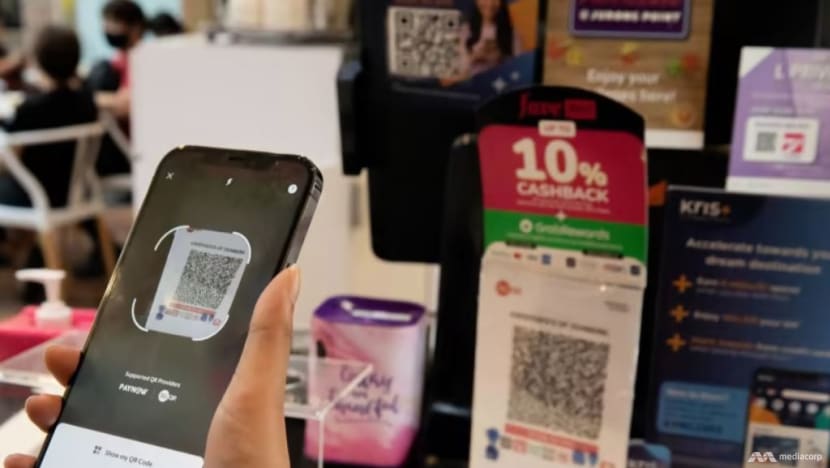Heart of the Matter: Is the move to cashless payments leaving some behind? How can we help them?
Singapore's adoption rate of cashless payments is one of the highest in Asia. But there are pockets of the population who still struggle to adapt. Whose job is it to help those stuck in the gaps? Steven Chia gets some answers in this episode of Heart of the Matter podcast

SINGAPORE: When Faye Sai, a third-generation hawker at the Amoy Street hawker centre, encounters seniors who struggle to pay for coffee without cash, she doesn’t hesitate to step in and help if they are fumbling with an app on their phones.
“When we deal with an older customer who's trying to use a cashless payment mode, we encourage and teach them. We say, 'Uncle it’s okay, let me show you. You do one time, second time and third time will be very easy.'"
Ms Sai is also head of the Amoy Hawker’s Association and a guest on the Heart of the Matter podcast. With her on the discussion were group CEO of NETS Lawrence Chan and Lim May-Ann, director of the Fair Tech Institute at Access Partnership.
While the elderly are often willing to learn new technologies, they face what Mr Chan calls the “self-suppression” challenge which usually happens when there’s a long queue at peak dining times.
These seniors become conscious of themselves when they try and fail to use cashless payments.
“That experience of being embarrassed the previous time holds you back from wanting to do it again ... So, breaking that self-suppression is very important for us to get a deep penetration of usage into the community," said Mr Chan.
Aside from the elderly, Ms Lim noted that cashless payments are also challenging for those with disabilities – from the hearing and visually impaired to those with dementia and other special needs.
“We work a lot with disadvantaged people. And this is something I can't reconcile (about going) cashless ... If you can't see what you're doing, then you really can't use these platforms. What are we doing (from a systems point of view) about the people we are not including in this pursuit?” said Ms Lim.
But she also acknowledged that various industry stakeholders are open to solving pressing problems when there is feedback. She gave the example of QR codes. When they first came into the scene, there were too many, but the Monetary Authority of Singapore (MAS) stepped in, and the SGQR code system was implemented.
“We are very much in the process of learning. And I love the fact that we're always constantly improving, we just need to demand that of ourselves and of each other," said Ms Lim.
Here are some other highlights of the conversation:
AVOID GETTING SCAMMED
Mr Lawrence Chan: If you use your bank app to scan a QR code for payment, this payment is expected to be done right. If you use a camera to take a picture of a QR code that leads you to a website, there’s no cryptography. There's no way it will be authenticated and therefore payment will not be done.
Ms Faye Sai: I get feedback from the older hawkers about the times they've been scammed, not once, but twice by the same customer. (They) would show a screenshot and it’s the lunch (crowd), so the hawker has no choice but to glance quickly, and then give the product that she thought was paid for, but it was not.
Everyone has a responsibility to do their own digital literacy research, to be informed of how (the tech) works, it should work both ways.
WHAT IF THERE IS NO WI-FI OR AN ONLINE OUTAGE?
Mr Chan: From a policy standpoint, there's almost always a backup, to make sure that the country doesn't come to a standstill. We invest a lot to not even have to depend on backup. The amount of investments that we've made from a safety and security standpoint, is there today.
Ms Sai: Just be a little bit more gracious at the point of transaction, whether it is a breakdown, like there's no Wi-Fi, then connect to your own 4G. If there’s no 4G, use cash. Don’t insist on paying by a certain method just because you want the cash back.
Sometimes I think you have to look at the bigger picture and think for others, not just for yourself.
GETTING YOUR MONEY BACK IN CASE THERE’S AN ERROR
Mr Chan: We've had many cases where there's been very successful attempts to get your money back, whether it is the merchant paying the consumer back because he put the zero, the decimal point in a wrong place, or the bank giving the money back to the consumer.
Even though there are no rules in place that you have the right to dispute a transaction, we have been able to still gain the trust.

















